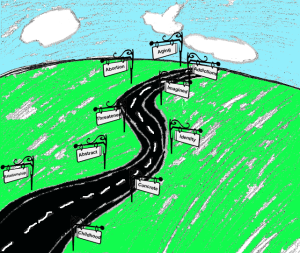(Click on image for larger view)
A few weeks ago, I began a series on The Grieving Process for Adults. I invited you to take a journey with me down The Highway of Life to view losses you might have encountered on your journey through life.
As we traveled down the road together, we viewed losses that consisted of: Childhood Losses, Relationship Losses, as well as numerous Different Types of Losses, ranging in degrees from Imagined Losses to Abortion.
I hope it has widen your view to recognize losses other than the most visible ones. It is my prayer that, not only will you receive emotional and spiritual healing from every loss you have ever experienced, but it will also enable you to help children when they experience a loss.
Today, I want to briefly point out ways showing how all losses are related.
1. Everyone suffers losses — there are no exceptions.
We sometimes think that we are the only one who life throws a curve ball to and might want to have a pity party for ourselves. But, the truth of the matter is, from the young to the old, no one is exempted from experiencing a loss and the pain associated with it.
2. Losses vary in intensity and degrees, but the consequence of pain is the same.
From the loss of a car to the death of a loved one, losses may vary in intensity and degrees, but pain is pain, no matter the degree of the loss. It is the pain that God wants to heal.
3. Our response to every loss is the same until we allow the Lord to heal us of our emotional response.
Getting our emotions under control play a vital part in the healing process of a loss. Many times we are controlled by a negative emotional response starting as far back as childhood.
Therefore, it is so important to take control of a negative response, less it becomes our normal way of responding to all circumstances in life.
4. Secondary losses are those losses that are a result of the initial loss.
Example: If the initial loss is divorce, loss of trust, finances, and confidence might occur also. Each secondary loss must be identified with the initial loss.
5. Childhood losses are perceived with childlike wisdom, knowledge, and experience.
Adult situations are often handled with the same childish wisdom and knowledge if a childhood loss and its emotional response to it has not be healed.
6. Loss of identity must be traced back to how and when it was lost.
Just saying, “I don’t know who I am,” is only the starting point. “Revisiting” your life in various stages is the key to begin the process of rediscovering yourself and who you are in Christ.
7. God is a God of redemption, not condemnation, no matter what the loss.
Many women are in excruciating pain from the lingering effects of having had an abortion. However, they sit in silence because of the shame that is commonly associated with women who have had an abortion. But, the good news is: Jesus Christ is one of redemption, not one of condemnation, regardless of what we have done.
8. All losses must be mourned and go through The Grieving Process.
The Grieving Process moves us one step at a time to the acceptance stage of the loss. This doesn’t mean that you forget the loss or approve of it, it just means you won’t hurt from the loss anymore; the sting will no longer be there, and life goes on.
My friends, if you have been following me the past few weeks as I have listed the many different types of losses, perhaps you feel overwhelmed as I once did.
Allow me to re-quote the scripture that so vividly showed a picture of me in my early twenties.

“Why should ye be stricken anymore? Ye will revolt (rebel) more and more. The whole head is sick, and the whole heart faint. From the sole of the foot even unto the head, there is no soundness in it; but wounds, and bruises, and putrefying sores: they have not been closed, (healed) neither bound up, neither mollified with ointment.”
If God can take a life like mine that was sick from my head to my toe and bring healing into it, He can yours, too. It may not happen overnight — healing is a process — but I promise you, it will happen.
Join Hannah and me next week, as we define exactly what it means to grieve, its purpose, and you will also be introduced to the steps in The Grieving Process.










